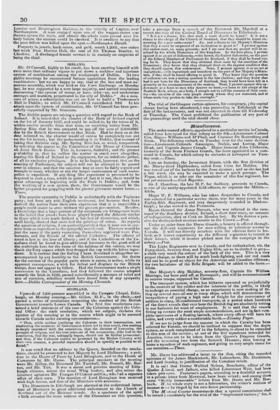SCOTLAN D.
Upwards of I500 persons assembled in the Cowete Chapel, Edin- burgh, on Monday evening,—Mr. Gillon, M. P., in the chair,—and passed a series of resolutions respecting the conduct of the British Government towards Lower Canada. The first five resolutions con- tained a brief statement of the case of the Colonists against the Colo- nial Office : the sixth resolution, which we subjoin, declares the opinion of the meeting as to the course which ought to be pursued towards Canada under existing circumstances-
" That, while neither justifying the Colonists in their insurrection, nor vindicating the measures of Government which led to that result, this meeting is deeply imprened with the conviction, that the dictates of humanity, the precepts of religion, and the true interests of the community, alike lead to the conclusion, that the war, unhappily begun, should not be further prosecuted ; and that, if the Colonists cannot be governed by the Mother Country with their own consent, a peaceful separation should as speedily as possible be ee fected."
It was voted that an address to the Queen, founded on the resolu- tions, should be presented to her Majesty by Lord Melbourne ; a peti- tion to the House of Peers by Lord Brougham, and to the House of Commons by Mr. Hume. the principal speakers at the meeting were Mr. Gillon, the Reverend Mr. Turnbull, Mr. Russell, Mr. Bur- ton, and Mr. Tait. It was a decent and genuine meeting of Edin- burgh citizens, minus the usual Whig leaders, and also minus the itinerant agitators Mr. Feargus O'Connor and Co., who 1 ad a separate affair of their own. The mention of Lord Brougham was received with high favour, and that of the Ministers with aversion..
The Dissenters in Edinburgh are alarmed at the understood inten- tion of Ministers to grant additional endowment to the Church of Scotland out of the Bishops' teinds. As a specimen of the spirit v hick actuates the more zealous of the Dissenters on this question, take a passage from a speech of the Reverend Mr. Marshall at a recent meeting of the Central Board of Dissenters in Edinburgh-
" Is it n n o shame, Sir, that such a want should be found ? Is it not a shame to the clergy of the Church of Scotland, that they should be found cla. mouring fur a new endowment? Ay, and a shame to her Majesty's Ministers that they s'iould be suspected of an inclination to grant it ? I protest' against this endowment, on many grounds; and I am sure that my protest will be re. echoed by the whole Dissenters of this kingdom. In the first place, I protest against it as an act of dishonesty,—the basest, the foulest dishonesty, on the part of the Liberal Members of Parliament for Scotland, if they shall be found vot- ing for it. They know that they obtained their seats by the exertions of the Dissenters ; they know that they obtained them on the express condition that they should oppose this endowment. Next, I protest against it as an act of ingratitude,—vile ingratitude and treachery on the part of her Majesty's Minis- ters, if they shall be found offering to grant it. They know that the question of endowments was a testing question at the late election; and they know that had it not been for the Dissenters of Scotland, they would have been left is a minority at the commencement of the session. Next, I protest against this en- dowment as a boon to men who deserve no boon,—a boon to the clergy of the Scottish Kirk, whom, as a body, I scruple not to call the enemies of their coun- try—the enemies of ;he very people among whom they are stationed, and of whose souls they profess to take the oversight."


























 Previous page
Previous page